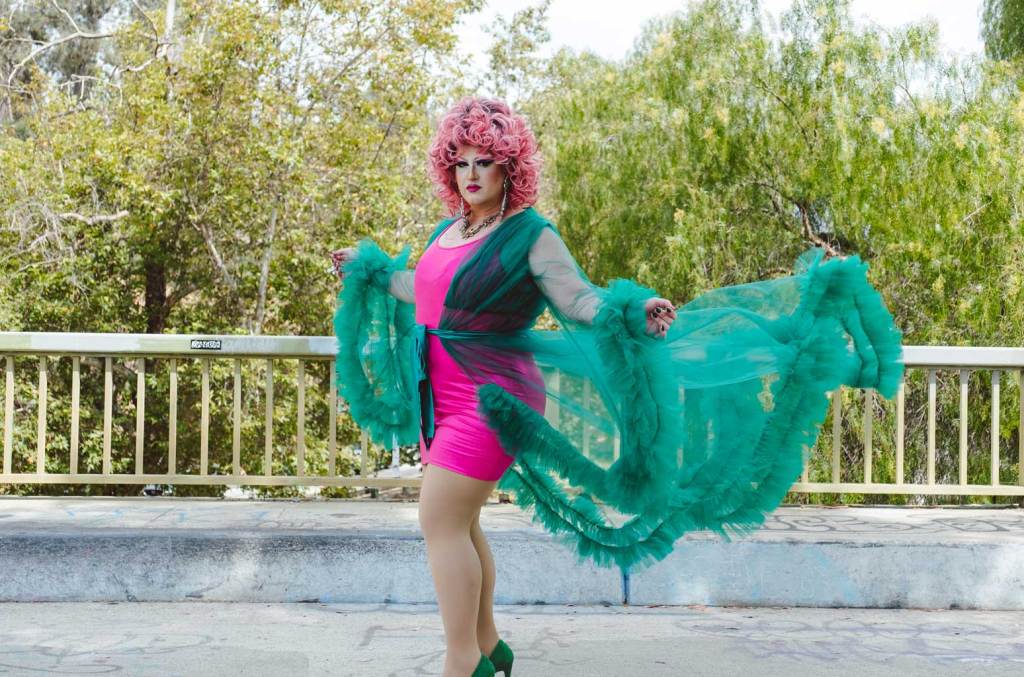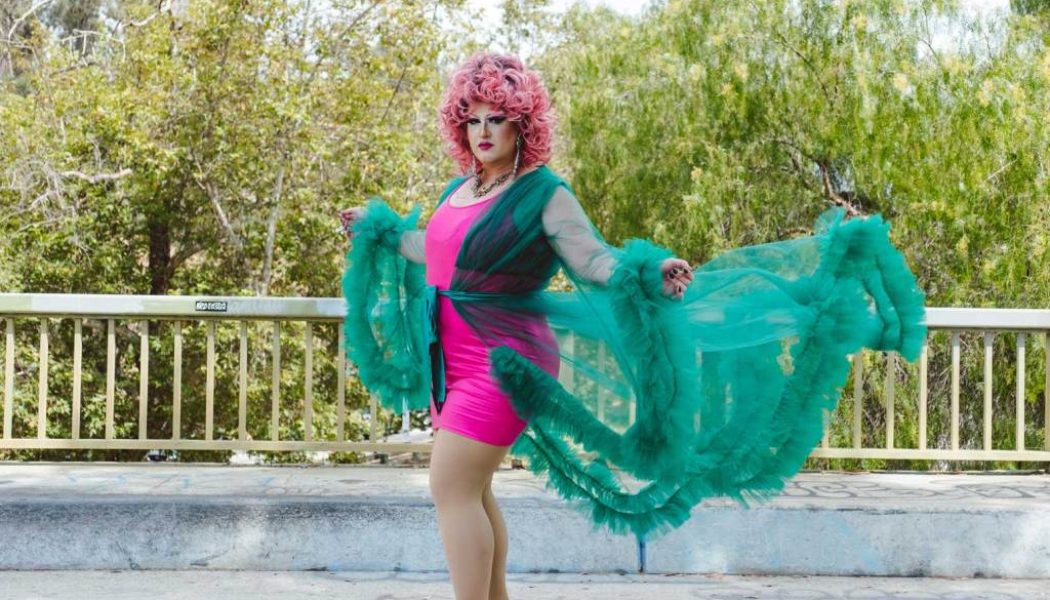
Matthew Blake knows how to deal with internet trolls; being a Christian queer person with a substantial online following, they’ve been doing it out of necessity for the better part of three years. But they had no idea that clapping back at one would lead them to the top of an iTunes chart.
“It’s been very, very cool,” Blake tells Billboard over Zoom, a smirk crossing their face. “If there’s one thing that every drag performer has in common, it’s that we know how to capitalize on a moment.”
Blake is better known online as Flamy Grant, the self-described “shame-slaying, hip-swaying, singing-songwriting” drag queen making Christian music that speaks directly to their experience as a queer person. While that perspective helped earn Flamy over 80,000 followers on TikTok, it also recently put her in the crosshairs of another Christian artist.
Sean Feucht, a singer and preacher known for hosting maskless concerts to protest government restrictions at the height of COVID-19 and claiming that he wants God to “take over the government,” posted an article last Wednesday (July 26) commenting on Christian singer Derek Webb’s recent album release show. The lead photo for the piece showed Webb posing with fellow Christian artists Plumb, Jennifer Knapp, and Flamy Grant.
“If you’re wondering the end goal of the deconstruction movement in the church, then look no further than former worship leader @derekwebb’s new collab with a drag queen,” Feucht wrote. “These are truly the last days.”
Immediately joining a text thread with Webb and the other artists pictured, Blake (who uses they/them pronouns out of drag) tells Billboard that the group saw Feucht’s post as an opportunity. “Derek was the one who said, ‘He does have this insane platform, and there’s got to be a way to leverage it,’” they recall. “I didn’t think things through, which is kind of a hallmark for me — I am very impetuous, I dive right in.”
Blake cheekily quipped that “we’re just getting started” in response to Feucht’s post, which only further drew out the preacher’s ire. “Well good for us hardly anyone listens or cares what you do,” Feucht wrote, before continuing to assert false anti-LGBTQ rhetoric about drag artists forcing “perversion” on children.
“You say that to a drag queen? Baby, what were you thinking?” Blake says, laughing. “What’s gonna happen? She’s gonna run with it.”
Jumping over to her TikTok, Grant began a grassroots campaign amongst her following to get “Good Day,” the queer-affirming worship song off of her album Bible Belt Baby, to land on iTunes’ Christian charts. In the video, she pointed to Semler, another out Christian artist and a friend of hers, who earned a No. 1 song on iTunes’ Christian charts earlier this year. “I’m not trying to get to No. 1, I’m just trying to crack the charts,” Grant said in the video, tempering her own expectations.
Yet within 24 hours of her original post, “Good Day” briefly hit No. 1 on iTunes’ Christian Songs charts, and her album Bible Belt Baby reached No. 1 on their Christian Albums chart — where it stayed for seven straight days, until falling to No. 2 on Aug. 3 to Lauren Daigle’s Look Up Child.
While neither “Good Day” or Bible Belt Baby have managed to crack Billboard‘s Christian charts yet, Blake remains amazed at the power of their modest-but-mighty fans online. “It’s wild because the album is 10 months old,” they say. “I’m still in that touring phase, but this certainly brought it up to a level I did not anticipate 10 months into the release of this.”
The Flamy Grant persona was born in 2020 out of a curiosity Blake developed while on lockdown during the pandemic. Developing the character felt like “inner child work,” they say, where they finally got to go back and accept themselves. “I was going back to the little kid that was clomping around on my mom’s heels and getting in trouble for ruining her lipstick and saying, ‘Hey, everything that they told you was not okay about you is so okay,’” they say.
And yes, the inspiration behind their drag name does, in fact, know all about it. “I know Amy Grant knows about me,” Blake says with a smile. “Some people who were in her orbit have talked to me and said, ‘Amy thinks it’s great.’ I am hopeful that there will be some kind of collaboration someday.”
When a pastor at their progressive Christian church asked Blake if they would want to perform a sermon during one of their virtual services during the pandemic, they agreed, filmed it, and posted a clip of it on TikTok. After it blew up, Blake knew that they were onto something. “It was like, ‘Oh, this is not just for me. This is actually able to speak to people, and they’re all saying that this makes them feel safe and seen,’” they recall. “That’s all I ever want my art to do.”
During the 22 years they worked as a worship leader before adopting the Flamy Grant mantle, Blake dabbled in releasing folk music under their own name, including their 2007 album Back As Far As We Can Go and a series of one-off singles in the years since.
Blake grew up listening to Christian music, and says they don’t recognize the genre today compared to when they were younger. “That’s the thing about Christian music — it was never defined by any actual genre,” they say. “It was a rubber stamp saying, ‘Your kids will be safe listening to this.’ Now, a lot of Christian music feels like an assembly line of trite, overused clichés about how, ‘I’m gonna sing to God about how good God is.’”
With the increasing amount of attacks on drag performers and the queer community, as well as anti-LGBTQ rhetoric coming from evangelical Christian nationalists, Blake feels that there has never been a more important time to have real LGBTQ representation in Christian music.
“I chose Christian music because it matters to me. The reason I’m here is because I know there are queer kids still growing up listening to this,” they say. “I want them to see the options available to them. I don’t want them to have to go through what I did, which was to conform, or get kicked out.”
As for the Sean Feuchts of the world? Blake is happy to watch as their efforts to shame queer people continue to fail. “They’ve always tried to invalidate our existence,” they say, before coyly looking directly into the camera and grinning. “But Sean, this never would have happened without you!”









